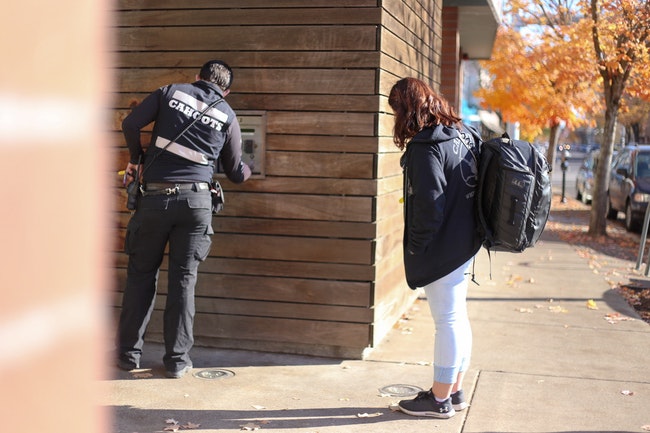 Brenton Gicker, left, and Katie Haney call up to a woman in order to check on her at her apartment. The two CAHOOTS workers responded to low-level 911 calls. (Troy Brynelson/Salem Reporter)
Brenton Gicker, left, and Katie Haney call up to a woman in order to check on her at her apartment. The two CAHOOTS workers responded to low-level 911 calls. (Troy Brynelson/Salem Reporter)
Jacque Heavey witnessed a man on Oct. 5 sitting on a bench by the tennis courts at Bush’s Pasture Park and loudly talking to himself.
On Oct. 7, Heavey saw the man in the same place but standing, agitated, screaming and frantically moving around the benches. When she approached him, he yelled at her to take her clothes off. She didn’t want to call police for fear of further inflaming the situation, she said. She would’ve called a crisis response unit had it been available to her.
The next morning, she was driving down Mission Street with her children when she almost hit the same man with her car as he crossed the middle of the road into speeding traffic.
“It could have been a fatality on Friday morning, but one could argue that the tragedy had been unfolding all week,” Heavey wrote in an email to Salem City Councilor Vanessa Nordyke on Saturday.
As many Salem residents continue to call for a program where mental health workers respond to some crisis calls instead of police, county officials are hesitant to create another crisis response unit. They said they would prefer to zero in on programs already in place through law enforcement, and money would be better spent on places like navigation and sobering centers to take people in crisis.
Marion County runs two crisis response programs. One is called the Mobile Crisis Response Team, comprised of an officer and a qualified mental health professional. Officers can call the group to take over and help de-escalate a person experiencing a mental health crisis. Over the past three years, the Mobile Crisis Response teams responded to an average 630 calls a year.
Another program is called Community Crisis Outreach Services. It’s comprised of a sheriff’s deputy and mental health professional who review police reports and follow up with people to help them avoid the criminal justice system and get them connected with services.
The Community Crisis Outreach Services team has done more than 100 follow-ups to police reports since May.
Chad Ball, policy analyst for the Marion County Board of Commissioners, provided those figures when Salem Reporter requested data tracking crisis response calls and follow-through for the Mobile Crisis Response Team and Community Crisis Outreach Services.
Despite widespread public support for a crisis response program separate from police, the city of Salem recently paused plans to start one through United Way of the Mid-Willamette Valley after learning the state money they hoped to use had to first go through Marion County. Meanwhile, county officials didn’t want to pursue a program that overlapped with crisis response services already in place.
The city’s plans for a non-police crisis response program received broad support from Salem residents who testified as the city was planning its budget for the coming year. Nearly 100 people wrote to the budget committee asking members to recommend funding for a program and more than a thousand signed a petition.
Salem Reporter in its newsletter recently asked readers to share their thoughts on the plan and the crisis response services currently in place in Salem. Of the 19 email responses, the overwhelming majority expressed support for a crisis response program where mental health workers, not police, would respond to some crisis calls.
“Salem definitely needs to relieve police of the task of trying to deal with emotional and psychological crises for which they are not trained and – quite likely – are not ideologically oriented toward,” said Peter Bergel. “Asking people to do these things, when they are also charged with stopping or solving crimes, providing other security services and are authorized to use violence when necessary, is unfair and setting them up for failure.”
“Salem really needs this service,” Careylynn Patterson wrote. “We have people roaming around south Salem either having mental crisis or drug issues and if you call the police they tell you there is nothing they can do. I am really sick of the bureaucracy the sheriff’s dept, city manager, Salem police, whomever, is stopping the progress the people of Salem are demanding. And they wonder why the citizens of Salem are very unhappy about how our city is run.”
Sgt. Jeremy Landers, a spokesperson for the sheriff’s office, said more resources in the community would help Marion County improve its crisis response.
“We believe the community would directly benefit by having resources readily available including having a navigation center, sobering center, and increased capacity for addiction treatment services,” Landers wrote in an email.
Any police officer or sheriff’s deputy in Marion County who responds to a nonviolent call and determines the person is experiencing a mental health crisis can contact the Mobile Crisis Response Team.
“It’s not a clean handoff,” said Jeff Stutrud, Enforcement Division commander for the sheriff’s office, “but it shortens the amount of time that the patrol deputies are spending dealing with that individual in that situation.”
In place since 2014, the Mobile Crisis Response Team includes four uniformed officers — one Marion County sheriff’s deputy, two Salem Police Department officers and one Woodburn Police Department officer who applied and interviewed for the position. Mental health workers were on the selection panel.
Once selected, their shift consists of driving around the county with a mental health professional and responding to 911 calls involving people in crisis, Stutrud said.
Landers said one team is typically on a shift at a time. Teams’ shifts overlap around four hours a day, Ball said, and they sometimes provide consultations over the phone to other officers who have questions regarding a call.
“Can we get to a point so we can have a conversation about what’s going on without using force, without making an arrest?” Stutrud said. “The intent is really to de-escalate the situation so that we can get down to providing some sort of help that the person needs without taking them to jail.”
The teams can take people to Salem’s Psychiatric Crisis Center, a 24-7 center on Salem Hospital’s grounds operated by the county’s Health and Human Services Department.
The center has averaged over 34,000 crisis calls and 4,600 crisis evaluations each year over the last three years, Ball said.
“The crisis evaluations are focused on the primary crisis that day, and how we can assist the person with their immediate needs,” Ball said. The evaluations focus on the person’s safety, whether they have situational stresses or a history of mental health concerns, whether they are connected to services and whether staff can help them do so.
A nurse practitioner provides services at the crisis center 16 hours a week for crisis mitigation and helping people access community services.
“That’s an option for us to take folks if they’re willing to go down there and just talk to somebody,” Stutrud said.
Through Community Crisis Outreach Services, started in 2010, plain-clothed sheriff’s deputy Derek Hayman and a mental health professional from the Health and Human Services Department review police reports from every agency in Marion County to look for people with mental health issues to follow up with.
They refer people to resources including counseling, medical care, insurance, medications, peer mentors and support, alcohol and drug treatment and veteran’s assistance, according to the county’s website.
“Our goal is to connect people with services and not take them to jail at all,” Hayman said. “We try to build a rapport with the clients and help motivate them to obtain the services that we or their family feel might be necessary.”
“If they don’t want the help today, then we’ll follow up with them again the next week and the week after until they either tell us to leave them alone or they start having a conversation with us about services,” he said.
The Community Crisis Outreach Services team provides 40-hour crisis intervention training to local law enforcement, including the sheriff’s office and Salem, Keizer and Woodburn police.
Landers said the sheriff’s office has had a goal for several years to have every one of its deputies attend the full crisis intervention training. “We attempt to get deputies into the first available class, placing a priority on those who are most likely to be involved in a crisis response,” he said.
The county coordinates all crisis response services with other local mental health providers and insurer PacifcSource to help connect people with longer-term services, Ball said.
Contact reporter Ardeshir Tabrizian: [email protected] or 503-929-3053.
JUST THE FACTS, FOR SALEM – We report on your community with care and depth, fairness and accuracy. Get local news that matters to you. Subscribe to Salem Reporter starting at $5 a month. Click I want to subscribe!
PRIOR COVERAGE:
Mental health workers, not police, could be responding to calls in Salem by August
Salem Budget Committee recommends funding for mobile unit to respond to crisis calls
Salem residents call for a crisis response team in city budget









